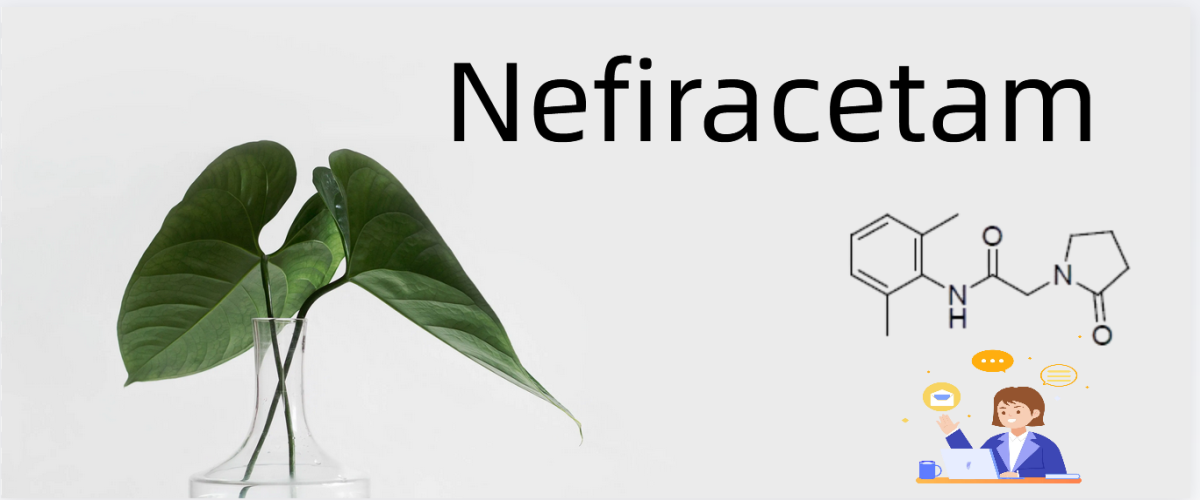In today's fast-paced world, our ability to remember and learn new information plays a vital role in our personal and professional lives. Whether you're preparing for an important exam, seeking career advancement, or aiming to improve your overall thinking skills, optimizing your memory and study skills is key. By incorporating nefiracetam into your daily routine, you can experience dramatic enhancements in memory, cognition and learning.
Nefiracetam is a nootropic compound that belongs to the racetam family. Known for its cognitive-enhancing effects, it is often used as a learning aid or to support mental performance. Nefiracetam is popular for its ability to improve memory, learning, and overall cognitive function.
Nefiracetam was developed in Japan in the 1990s and is structurally similar to other racemic compounds such as piracetam and aniracetam. However, nefiracetam stands out for its unique mechanism of action. It enhances the function of neurotransmitter receptors in the brain, especially glutamate receptors, which are important for learning and memory processes.
Nefiracetam demonstrated positive effects on memory and learning ability. It increases the release of neurotransmitters like acetylcholine, which plays a vital role in cognitive processes. By modulating these neurotransmitter systems, nefiracetam promotes synaptic plasticity, neuronal survival, and neuroprotection, ultimately enhancing memory formation and retrieval.
Additionally, it may support overall brain health by preventing oxidative stress and reducing the buildup of harmful substances in the brain. These neuroprotective effects make it a potential drug candidate for the treatment of neurological diseases such as Alzheimer's disease and dementia.
The mechanism of action of nefiracetam is complex and is not yet fully understood. However, research offers some insight into how this nootropic exerts its cognitive-enhancing effects.
First, nefiracetam is known to modulate acetylcholine neurotransmission. Acetylcholine is a key neurotransmitter involved in learning, memory and attention. By increasing the release and uptake of acetylcholine in the brain, nefiracetam promotes better communication between neurons and enhances memory formation and retrieval.
In addition, nefiracetam was found to enhance the function of glutamate receptors, specifically AMPA and NMDA receptors. Glutamate is the major excitatory neurotransmitter in the brain and plays a crucial role in synaptic plasticity associated with learning and memory processes. By increasing the activity of these receptors, nefiracetam promotes synaptic plasticity, thereby improving cognitive function.
In addition to its effects on acetylcholine and glutamate, nefiracetam also affects other neurotransmitter systems. It has been shown to modulate the release and action of gamma-aminobutyric acid (GABA), the major inhibitory neurotransmitter in the brain. By modulating GABAergic neurotransmission, nefiracetam promotes a homeostasis of neuronal activity and prevents hyperexcitability that can impair cognitive function.
In addition, nefiracetam has been found to have neuroprotective properties. It helps reduce reactive oxygen species (ROS) production and prevent oxidative stress, which can cause neuronal damage and impair cognitive function. These neuroprotective effects make nefiracetam a promising drug candidate for the treatment of neurodegenerative diseases such as Alzheimer's disease.
The exact mechanism by which nefiracetam exerts its neuroprotective effects is not fully understood. However, it is thought to be involved in the regulation of brain cell calcium homeostasis, activation of antioxidant pathways, and suppression of inflammatory processes. These multifaceted mechanisms contribute to the overall cognitive enhancement provided by nefiracetam.
◆enhance memory
Memory is a fundamental aspect of our cognitive function, allowing us to retain and recall information. Nefiracetam has shown promising results in enhancing memory, especially in individuals with memory impairments. By increasing the release of key neurotransmitters such as acetylcholine, nefiracetam stimulates the memory centers of the brain, helping to form and consolidate memories.
By increasing the release of neurotransmitters like dopamine and serotonin, nefiracetam can increase alertness and help eliminate distractions. This can greatly improve learning and learning, allowing individuals to absorb information more efficiently and retain it for longer.
Additionally, nefiracetam was found to promote synaptic plasticity, the brain's ability to modify and strengthen connections between neurons. This improves memory and makes it easier to retrieve information when needed.
◆improve learning ability
Learning is the cornerstone of personal growth and development. Nefiracetam's ability to enhance the learning mechanisms of the brain makes it an invaluable tool for many individuals looking to master new skills with ease.
Research has shown that nefiracetam increases the release of neurotransmitters such as glutamate, which plays a crucial role in synaptic plasticity and learning. This allows the brain to form and strengthen connections more efficiently, which optimizes learning.
Additionally, nefiracetam has been found to enhance focus and concentration, allowing individuals to fully immerse themselves in the learning process. By reducing distractions and improving attention span, it paves the way for productive and efficient learning.
◆Dosege:
The optimal dose of nefiracetam varies from person to person, depending on factors such as age, weight, overall health, and specific cognitive goals. It is important to start with a lower dose and gradually increase the dose as needed, as each person may respond differently to the compound.
◆Guidance:
1. Always consult a healthcare professional: Before incorporating nefiracetam or any new supplement into your routine, it is recommended to consult a healthcare professional. They can provide personalized advice based on your unique situation and help determine the dosage and schedule of use that is best for you.
2. Follow the recommended dosage: Strictly follow the recommended dosage guidelines and avoid exceeding the dosage without professional advice. Increasing the dose beyond the recommended dose may cause unwanted side effects or diminish the desired effect.
3. Cyclic use of nefiracetam: In order to prevent tolerance or dependence, it is recommended to use nefiracetam cyclically. A common cycle is five to six days of work followed by two days off. This allows your body to reset and maintain the effectiveness of the nootropic.
4. Be patient: The effects of nefiracetam may not be immediately apparent as it usually takes time to establish in the system.
Q: Are there any potential side effects of Nefiracetam?
A: Some users have reported mild side effects such as headache, dizziness, nausea, and gastrointestinal discomfort. These side effects are generally rare and transient. It is important to note that individual experiences may vary, and if you experience any adverse effects, it is recommended to discontinue use and consult with a healthcare professional.
Q: Is Nefiracetam safe to use?
A: Nefiracetam is generally considered safe when used as directed. It has been well-tolerated in most studies, with minimal side effects reported. However, it is always recommended to consult with a healthcare professional before starting any new supplement, especially if you have any pre-existing medical conditions or are taking other medications.
Disclaimer: This article is for informational purposes only and should not be considered medical advice. Always consult a healthcare professional before using any supplements or changing your healthcare regimen.
Post time: Aug-15-2023








